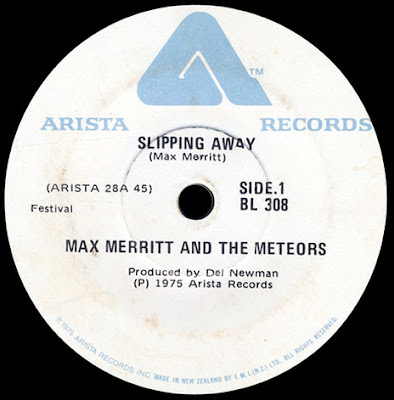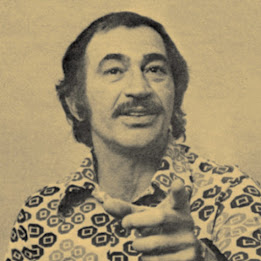Max Merrit (30 April 1941 – 24 September 2020) was a New Zealand-born singer-songwriter and guitarist who was renowned as an interpreter of soul music and R&B. As leader of Max Merritt & The Meteors, his best known hits are "Slippin' Away”, and "Hey, Western Union Man”.
Born in Christchurch, New Zealand, Maxwell James Merritt was interested in music from an early age and started guitar lessons at 12. By 1955 he encountered the rock and roll of Bill Haley and Elvis Presley. After leaving school in 1956, aged 15, Merritt formed the Meteors with friends Ross Clancy (sax), Peter Patonai (piano), Ian Glass (bass) and Pete Sowden (drums). Initially a part-time group, they played dances and local charity concerts, Merritt continuing his day job as an apprentice bricklayer in his father's business.
The band released their debut single, "Get a Haircut", in June on His Master's Voice. By 1959, the Meteors had become a top youth attraction, regularly pulling crowds of 500 or more. Merritt borrowed players from other bands if a Meteors' member was unavailable, one such band was Ray Columbus & the Invaders fronted by vocalist Columbus. Early in 1960, His Master's Voice released their debut album, C'mon Let's Go. Follow up singles were "Kiss Curl" and "C'Mon Let's Go" in 1960 and "Mr Loneliness" in 1961. They had local support but were almost unknown beyond the South Island. In an effort to break into the more lucrative North Island market, both Max Merritt & The Meteors and Ray Columbus & the Invaders relocated to Auckland in 1962 for two years before returning to Sydney.
 |
| Johnny O'Keefe & Max |
In Sydney, the Meteors made their first Australian television appearance on Johnny O'Keefe's Sing Sing Sing. By April 1965, the second Meteors' album was released on RCA Records and contained a range of styles, including the single "So Long Babe". During February 1966, visiting UK acts the Rolling Stones and the Searchers were supported on tour by Max Merritt and The Meteors. After a cruise ship gig to New Zealand Merritt heard Otis Redding's version of "Try a Little Tenderness" and recorded his own cover in 1967. Turmoil within the Meteors saw a rapid turnover of members.
In Melbourne, Merritt and his band initially found it difficult obtaining regular gigs and so travelled widely through the state. On 24 June 1967 the van they were travelling in collided head-on with a car. Many of the band members were injured. Merrit lost his right eye and had his face scarred. It took the band nearly a year to recover. By July 1968 they competed in Hoadley's Battle of the Sounds, finishing behind winners the Groove, the Masters Apprentices and Doug Parkinson.
In 1969 the group were re-signed by RCA and they released their first single for over two years, a cover of Jerry Butler's "Hey, Western Union Man", which reached No. 13 on the Australian singles charts. In early 1970 their third album, Max Merritt and the Meteors, was released with six original tracks and five covers. It reached No. 8 on the national albums chart. But following singles did not chart well and by 1972 Merritt had relocated again – this time to England.
In London from early 1971, the group played the UK pub circuit, initially with little success but their popularity slowly grew and they supported Slade and the Moody Blues on their tours. They were signed by US-based Arista Records who released A Little Easier with the title single "A Little Easier" in 1975. "Slippin' Away" was their second single from the album and captured the attention of radio listeners in both Australia and New Zealand. By 1977, with the advent of punk rock the band's popularity on the UK pub circuit had declined and they effectively disbanded. Merritt then relocated to the US.
Merritt relocated to Nashville, Tennessee, in 1977 and signed as a solo artist with Polydor Records, which released Keeping in Touch in 1979. He then moved to Los Angeles, where he continued to reside. He toured Australia in 1979, 1980 and 1981, returning there in 1996 to tour the club and pub circuit. After that, whenever Merritt returned to Australia, a reformed Max Merritt & The Meteors were in demand for special events and music festivals.In mid-April 2007, Merritt was admitted to a Los Angeles hospital with symptoms of kidney failure. He was diagnosed with Goodpasture syndrome, a rare autoimmune disorder that affects the kidneys and lungs. Merritt was struggling with his health and finances, so his manager organised a Concert for Max which raised $200,000. On 1 July 2008, Merritt was inducted by Glenn A. Baker into the ARIA Hall of Fame.
Merritt died in Los Angeles, California, on 24 September 2020, at age 79, 13-years after being diagnosed with Goodpasture syndrome. Prior to his death, Merritt had recorded a new album, titled I Can Dream. The album was released on 27 November 2020. (Edited from Wikipedia)








.jpg)







.jpg)



.jpg)
































